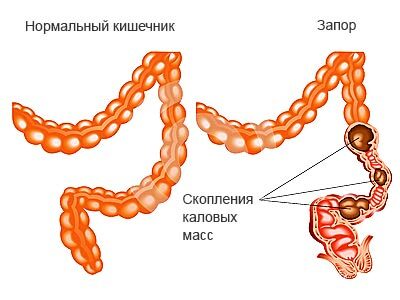The so-called premenstrual syndrome includes many negative effects, which often quite strongly affect the quality of life of a woman. In addition to the most common symptoms, like headache, increased irritability, swelling and blood pressure changes, many women are concerned about constipation before menstruation. What are the causes of disruption of the digestive tract and should it be treated?
Causes of constipation before monthly
Immediately before the onset of menstruation, there are significant fluctuations in the level of estrogen and progesterone in the blood. Actually, all clinical manifestations of PMS are associated with this factor. Hormonal changes cause a whole cascade of reactions in the body of a woman that affect a number of systems not associated with sexual( excretory, cardiovascular, nervous, digestive, and so on).

The causes of constipation with the monthly are associated just with the influence of hormones on the digestive system. This is how the sex hormones of women can indirectly affect the functioning of the gastrointestinal tract:
- First of all, fluctuations in the levels of estrogen and progesterone in the blood lead to disruption of water-salt metabolism, a decrease in the volume of circulating blood, the outflow of fluid into the tissue and, as a consequence,to peripheral edema. This redistribution of fluid in the body leads in turn to the fact that the feces in the large intestine become dry, dehydrated, with less mucus.
- The complex effect of the lability of the nervous system on the vegetative component also plays an important role. Scientists have proved that the nerve plexuses( Meissner and Auerbach) in the walls of the intestine of women have a decisive role in the activity of motor pathways in the alimentary canal. Therefore, during premenstrual syndrome, an agitated vegetal can lead to a disorder in the intestinal motility.
- Great importance is played by the increase in the size of the uterus. Immediately prior to the onset of menstruation, the thickness of the endometrium increases several times, the body receives a lot of blood, as a result, it increases in volume. The enlarged uterus presses on the walls of the intestine, thereby, first, reduces its motor skills, and secondly, narrows the gut lumen and hinders the progress of the food lump. All this often causes constipation and swelling before menstruation.
Obviously, digestion disorders associated with the menstrual cycle are temporary, functional. At the same time, they have several reasons and can provoke considerable inconvenience to the lady. Therefore, a woman should try to either cope with this problem herself, or contact a specialist.
Methods to combat the problem
If a woman's digestive problems occur just before the start of the menstrual cycle, there is no need to contact a specialized specialist. It is quite possible to manage oneself if you follow certain rules and recommendations. However, it is not always possible to do without the help of a doctor. To determine what to do, you need to ask yourself the question: are there constipation before every monthly cycle and does the treatment help? If the disorders are episodic and easily stopped with medications, then relief of the symptoms can be achieved by observing the regime of the day and nutrition. The following recommendations are of great help:
- To eat a fractionally, at least 4 to 5 times a day, it is desirable that the interval between meals does not exceed 3 hours.
- To exclude from the diet acute, smoked, salty foods, marinades, alcohol, coffee. Try to ensure that carbohydrates mainly come in the form of fiber and complex fibers instead of sugars.
- You do not need to limit yourself to liquid intake, however, instead of saturated teas, compotes or mineral water, it is better to drink ordinary water. So there is less likelihood that the fluid will go into the tissues and provoke the formation of edema.
- If possible, avoid stress, sleep at least 8 hours a day and have more in the fresh air. Well-proven hiking or low-intensity sports.
If compliance with these recommendations does not help to get rid of dyspepsia, you can try to be treated folk remedies. Good help is a decoction of rhubarb or an infusion of birch buds. In addition, the nettle has a relaxing effect. Decoction of her leaves should be taken 2 teaspoons 3 times a day. It additionally stimulates appetite and peristalsis.
From traditional medicine it is recommended to use "Picolax" drops or glycerin suppositories. They do not directly affect the digestive tract, they do not stimulate the intestines, but they dilute the stool and increase the amount of intestinal mucus, which facilitates the defecation process.

Due to the fact that in recent years, a lot of research has been done and the direct influence of the emotional state on vegetative nervous ganglions of the intestine has been proved( the studies were conducted in women), you can take sedatives, for example, "Phytosed" or soothing infusions of herbs. This will reduce the psycho-somatic component and will allow the bowels to function normally. Especially important is maintaining in the tone of the nervous system before the monthly, when hormonal changes in the blood can cause negative effects.
Summing up, it becomes clear why constipation before menstruation can be difficult to cure. This condition has many causes and is due to hormonal changes. And to interfere with your hormonal system is dangerous and fraught with consequences. Therefore, the optimal solution will be the relief of unpleasant symptoms folk or medicines. And already if such therapy does not help, or signs of dyspepsia are aggravated, it is necessary to address to the gastroenterologist or the gynecologist.

 We recommend reading an article about hemorrhoids with menstruation. From it you will learn about the causes of the disease and its symptoms, why hemorrhoids become aggravated in critical days, how to relieve the condition and whether pathology can be cured.
We recommend reading an article about hemorrhoids with menstruation. From it you will learn about the causes of the disease and its symptoms, why hemorrhoids become aggravated in critical days, how to relieve the condition and whether pathology can be cured.